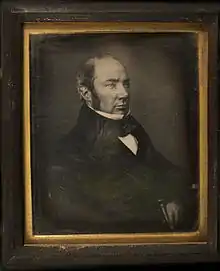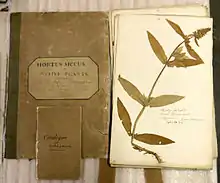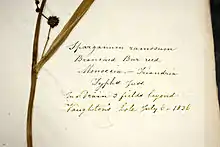William Ick
William Ick (1800 – 23 September 1844) was an English botanist and geologist.[1] In 1837 he won a prize offered by the United Committee of the Birmingham Botanical and Warwickshire Floral Societies for the best herbarium, known as a hortus siccus, of native plants collected within 10 miles (16 km) of Birmingham within a one-year period from 1 August 1836.[2]
William Ick | |
|---|---|
 Portrait of William Ick (Birmingham Museums, accession number 1964F109) | |
| Born | 1800 Newport, Shropshire, United Kingdom |
| Died | 23 September 1844 (aged 43–44) |
| Occupation | Botanist, geologist |


Early life
Ick was born at Newport in Shropshire in 1800. In 1803 his family moved to Birmingham. His father was a dealer in skins and hides.[3]
Career
Ick was a tutor at a school near Warwick before becoming the first curator of the Birmingham Philosophical Institution.[2]
Contribution to botany
In 1835 the United Committee of the Birmingham Botanical and Warwickshire Floral Societies offered a prize for the best herbarium of native plants collected within a 10 miles radius of central Birmingham between 1 August 1836 and 1 August 1837.[2] Ick won this prize with a herbarium of around 320 pressed plants and published his findings.[4] In 1948 Ick's herbarium was presented to Birmingham Museum and Art Gallery after being lost for over a century[2]
References
- Kent, D H; Allen, D E (1984). British and Irish Herbaria. London.
- Cadbury, Dorothy (1971). A Computer-Mapped Flora of Warwickshire.
- Maskew, Roger (2014). The Flora of Worcestershire.
- Ick, William (1836). "Remarkable plants found growing in the vicinity of Birmingham in the year 1836". The Analyst. 6: 20–28.